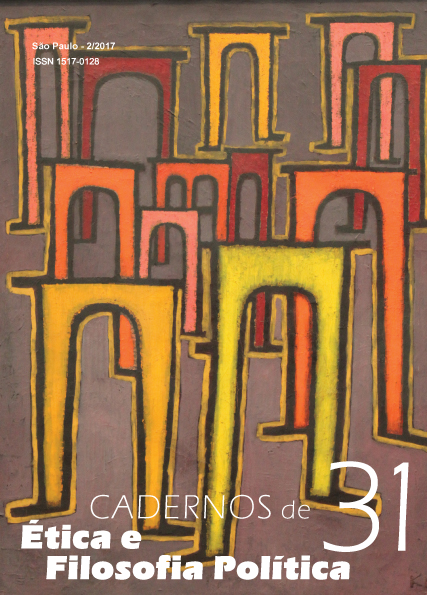Notes on the right of resistance in Locke´s second treatise of government
DOI:
https://doi.org/10.11606/issn.1517-0128.v2i31p98-115Keywords:
Resistance, Consent, Authority, RevolutionAbstract
Present article attempts to examine chapter XIX of the Second Treatise of Government, in which Locke concentrates his arguments in favor of the Right of Resistance. In this way, we highlight some fundamental points for demonstrating that the emergence of this Right comes from the exercise of Power without authority by ruler, a condition that implies the dissolution of government - with consequent loss of confidence on the part of the governed - so that such authority returns to subjects and they can, by means of a revolution, retain the supreme power to act according to their will or to reinstate the previous legislature, or even to institute a new one.
Downloads
References
ASHCRAFT, Richard. “Locke’s political Philosophy”. In: The Cambridge Companion to Locke. Cambridge: Cambridge University Press, 1995.
CORBETT, Ross J. The Lockean Commonwealth. Albany: State University of New York Press. 2009.
DUNN, John. The Political Thought of John Locke. Cambridge: Cambridge University Press, 1995.
LOCKE, J. Segundo tratado sobre o governo. In: Dois tratados sobre o governo. Trad. Julio Fischer. São Paulo. Martins Fontes. 2005.
MARSHALL, John. John Locke: Resistance, Religion and Responsibility. Cambridge: University Press, 1990.
SILVA, R. O. da. "Revolução, História e Tempo". In: História: debates e tendências. 2015.
SPITZ, Jean-Fabien. John Locke et les fondements de la liberté moderne. Paris. Presses Universitaires de France, 2001.
TULLY, J. An Approach to Political Philosophy: Locke in Contexts. Cambridge: Cambridge University Press. 2003.
Downloads
Published
Issue
Section
License
Copyright (c) 2017 Alessandra Tsuji

This work is licensed under a Creative Commons Attribution-ShareAlike 4.0 International License.


